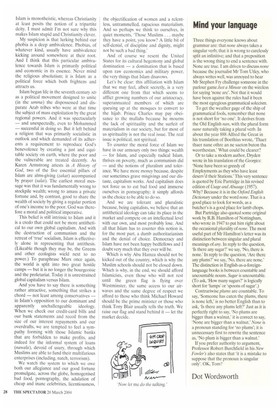Mind your language
Three things everyone knows about grammar are: that none always takes a singular verb; that it is wrong to carelessly split an infinitive; and that a preposition is the wrong thing to end a sentence with. None are true. I am driven to discuss none because the journalist Mr Tom Utley, who always writes well, was annoyed to hear Mr Stephen Fly challenge someone in the parlour game Just a Minute on the wireless for saying 'none are'. Not that it would have been against the rules had it been the most egregious grammatical solecism.
To get the weather gage of the ship of grammatical fools, remember that none is not short for `no one'. It derives from the Old English nan, with the plural form nane naturally taking a plural verb. In about the year 888 Alfred the Great in his translation of Boethius wrote, `Thaet thaer nane othre an ne saeton buton tha weorthestan.' What could be clearer?
Or to take a modem author, Dryden wrote in his translation of the Georgics: 'None have been so greedy of Employments as they who have least deserv'd their Stations.' This very sentence is quoted by Eric Partridge in his revised edition of Usage and Abusage (1957). Why? Because it is in the Oxford English Dictionary under the word none. That is a good place to look for words, as a butcher's is a good place for lamb chops.
But Partridge also quoted some original work by R.B. Hamilton of Nottingham, who wrote in 1947 to put him right about the occasional plurality of none. The most useful part of Mr Hamilton's letter was its distinction between singular and plural meanings of any. In reply to the question, 'Is there any sugar?' we say, 'No, there is none.' In reply to the question, `Are there any plums?' we say, 'No, there are none.' The distinction in English-as-a-foreignlanguage books is between countable and uncountable nouns. Sugar is uncountable. (To ask, 'How many sugars?' is logically short for 'lumps' or 'spoons of sugar'.) Contrariwise plums are countable. To say, 'Someone has eaten the plums, there is none left,' is no better English than to ask, 'Is there any plums left?' Just as it is perfectly right to say, 'No plums are bigger than a walnut,' it is correct to say, 'None are bigger than a walnut.' None is a pronoun standing for 'no plums'; it is unnecessary first to rewrite the sentence as, 'No plum is bigger than a walnut.'
If you prefer authority to argument, Professor Robert Burchfield in his New Fowler's also states that 'it is a mistake to suppose that the pronoun is singular only'. OK, Tom?


















































































 Previous page
Previous page